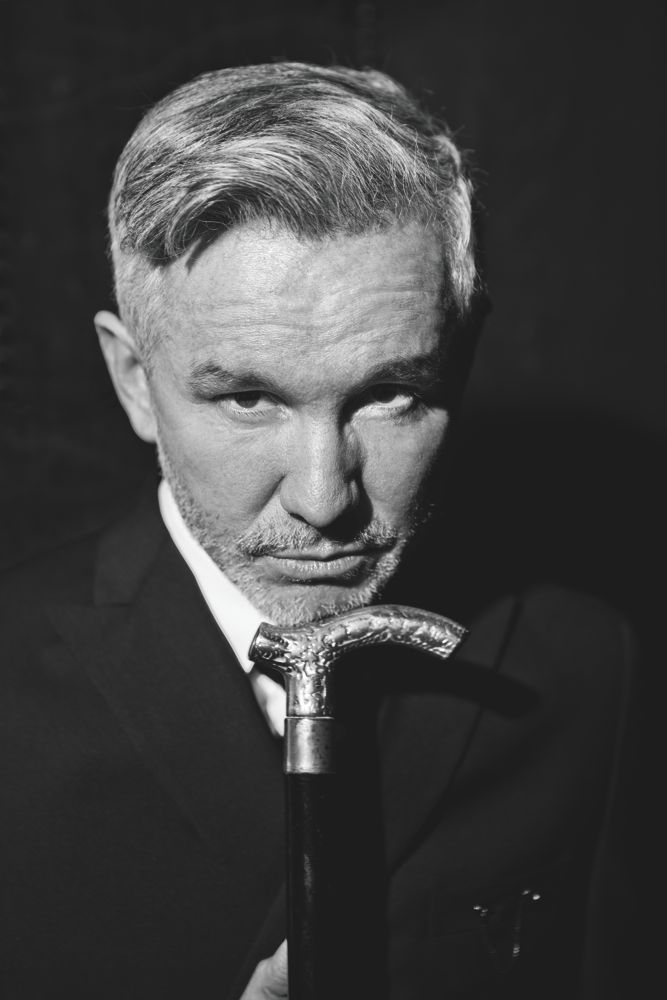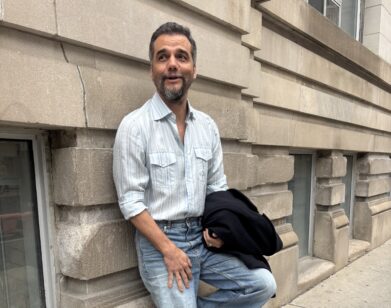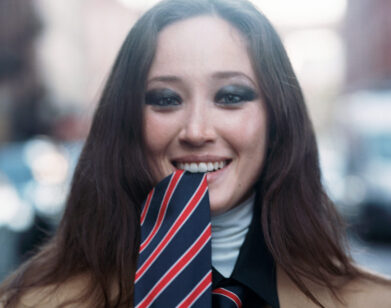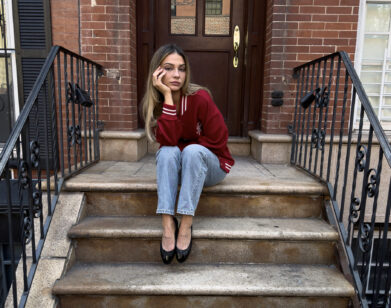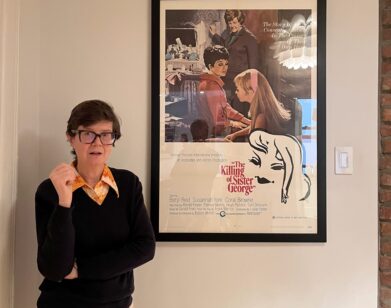Baz Luhrmann
EVERYONE has THEIR GATSBY. EVERYONE HAS THEIR DAISY. THE MARK OF a GREAT BOOK IS that IT CAN BE TOLD many DIFFERENT WAYS IN MANY DIFFERENT TIMES in MANY DIFFERENT PLACES. Baz Luhrmann
The most famous light in American literature is unquestionably the green one that hangs on Daisy Buchanan’s East Egg dock and is visible across the water on the West Egg lawn belonging to Jay Gatsby. In F. Scott Fitzgerald’s 1925 novel, The Great Gatsby, the green light, which the sanguine playboy believed in so much that he reached for it, is described in the last chapter as “the orgastic future that year by year recedes before us,” and has come to represent pretty much every spectrum of the American Dream—greed, longing, self-invention, hope, money, determination despite all odds, delusion, transcendence, and the American East itself.
The green light is so bright and yet so elusive that, cinematically, it could also symbolize the several attempts to turn the novel into a motion picture worthy of its decadent power. There have been several attempts, among them, Jack Clayton’s 1974 version for Paramount Pictures that seemed so promising in its sterling casting job—Robert Redford as Gatsby, Mia Farrow as Daisy, both gorgeously in their adult prime—that the resultant, impressively quiet, humble picture of wealthy Long Island in the 1920s had the languid air of a car tire slowly deflating (which is unfortunate since Gatsby is not just a jazz-age party story or a class-warfare love story or a murder-suicide scapegoat story, but a story about automobiles).
Now, nearly 40 years after that benchmark in exactly what not to do with an American masterpiece, Australian director Baz Luhrmann brings his own explosive version of Gatsby to the screen. In every way, it is about as far from the Redford rendition as one could imagine. This month’s The Great Gatsby goes 3-D, with plenty of speed, spectacle, glitz, booze, fireworks, confetti, sweeping camera shots, and dance numbers that rival Luhrmann’s 2001 musical, Moulin Rouge. Its stars—Leonardo DiCaprio as the titular bootlegger, Carey Mulligan as the sweet and un-innocent object of his obsession, and Tobey Maguire as the narrator and loyal neighbor Nick Carraway—explore a feast of emotional ranges, deliriously happy to drunkenly enraged to waylaid by tears. Luhrmann also tapped Jay-Z as executive producer on the soundtrack, with songs by Beyoncé, Florence + the Machine, Lana Del Ray, Jack White, and the Bryan Ferry Orchestra.
While more literal fans of the novel may worry that Luhrmann has brought a bit too much early-21st century Las Vegas to early-20th century East and West Egg, it is hard to argue that the 50-year-old director (whose wife Catherine Martin worked as the costume designer for all of the flapper dresses and tuxedos; Miuccia Prada also designed some of them) didn’t also bring the fun and emotion that Fitzgerald worked so diligently to alight on the page. There is only one way a story is told first, but there are endless possibilities in its retelling, and Luhrmann seems to see Gatsby as less an American-origins story and more a universal one of love, desire, loss, and what happens after the party comes crashing down. He spoke by Skype from his home in Sydney, Australia, to his good friend Florence Welch in Los Angeles. They had their own transpacific party.—Christopher Bollen
FLORENCE WELCH: Baz!
BAZ LUHRMANN: Wow. You look beautiful. I’m amazed what a great instrument Skype is visually. Why is it that you always look fresh, like you’re having a lot of fun—and yet I know the life you lead!
WELCH: Some lady just came by and put acid on Hannah Giannoulis’s [Welch’s manager] and my faces. We got peels.
LUHRMANN: I was thinking about putting a bucket of acid on my face. Does she have some left for me?
WELCH: We’ve got the other kind of acid as well. We’ve got acid on our faces, we took some acid, now we’re glowing. [laughs]
LUHRMANN: I’m in my bedroom right now. I just watched the final run of the movie at Hoyts, the big local cinema here in Sydney—we used their screen. So I’ve seen what would have been called in the old days the “final answer print.” Have you seen the new trailer for Gatsby with your song “Over the Love”?
WELCH: I cried when I saw it. What a moment it was for me . . . When the song came on and the camera flew around the green light . . .
LUHRMANN: I think that power ballad, that aria, is a major piece of work—and forget the movie, I mean in general. In the film and the book, there’s a scene at the end of the party where a girl with red hair is standing by the piano, crying while singing. She’s obviously distraught about a fight with her lover. So we use your song as a bit of a score at that moment. It used to just play until the end of that scene, but I’ve taken it all the way until Jordan Baker, who has just met with Gatsby, meets Nick outside and tells him, “It all makes sense,” and the music swells up. Now, I didn’t use the whole song. I know the audience is going to be like, “Hey, keep going. I want to hear the rest of it!”
WELCH: Oh, that’s so exciting!
LUHRMANN: Songs are just hints in the movie. And I was glad to have your song in the trailer because I think having it already out there is going to inform that scene. It’s almost like a Greek chorus outside the movie. I genuinely mean that the working process of your song has been extraordinary. It’s really a piece of magic. It’s really the green light itself.
WELCH: I think another reason the trailer alone was so exciting is that we’ve all been living in this Gatsby kind of world lately.
LUHRMANN: Well, you make a hell of a Zelda.
WELCH: I think there’s just a general sense of the magic of the green light—like, “Go!”
LUHRMANN: We’ve done a few trailers for the film, and in the first one there was some great male energy and angst: Jack White doing the U2 song [“Love Is Blindness”] and, of course, Jay-Z. He’s been a great partner all the way through.
WELCH: It was so fun to work on the song with you, because I was in the studio watching, and you were sort of holding my hand. You were whispering directions into my ear as I was singing. It was such a multisensory Baz Luhrmann experience. I was watching the film while singing while being directed on Tobey Maguire’s thought process. I was singing Nick Carraway’s inner thoughts.
LUHRMANN: You were! Before we had your song in that moment, it was a scene where Nick was looking up at pictures on the wall as voices from the party said, “Who is Gatsby?” It really wasn’t working by itself. And I think it’s clear from the reaction to the trailer with the big emotional release of your song right there with the green light that those people who feared that the film was just going to be about the shimmering mirage of Gatsby’s parties can now take a collective sigh—like, “Oh, good, it’s about the green light,” the exultation of Gatsby seeking an impossible ideal. The funny thing is that every time I hear the big finale, I see you jumping around in that very particular way that only Florence jumps around—not only just onstage, but the weird kind of jumping that gets everybody excited and somehow brings lovely joy into the room.
FOR SOME REASON, I AM COMPELLED TOWARDS THESE TRAGIC ROMANCES, THE ISSUE OF LOVE AND ALL ITS VARIANCES. Baz Luhrmann
WELCH: Another exciting part for me about being on the Gatsby soundtrack is that the soundtrack to your film version of Romeo + Juliet [1996] dictated my whole teenage life. That’s what introduced me to Radiohead. I’ve got so many copies of that soundtrack, back when people used to buy CDs. I think you might be responsible for my interest in religious iconography and big emotions and musicals—which is basically my last two records. Flowers, hearts, crucifixes, lightning bolts, love, death! I think I’m still reeling from the effects of that movie.
LUHRMANN: If anything I did 17 years ago contributed to the package called Florence, then it wasn’t a complete waste of time.
WELCH: I’m wearing a necklace with the Virgin Mary on it right now—and a white satin dress with flowers on the shoulders. You see, I’m still reeling from that film. I was watching Romeo + Juliet recently and felt that you kind of reintroduced a whole generation to Shakespeare in this incredibly exciting and beautiful and emotional way.
LUHRMANN: Are you going to ask me why I did that?
WELCH: Well, what is your attraction to the canon, the canonical story?
LUHRMANN: There’s a very simple answer: When I was very young, I grew up in a totally isolated place, in a very small town. I always win the bet with anyone who says, “I lived in a small town”—I grew up in a town with 11 houses, and that was the big part of town. We lived on the outskirts. But the thing is, my dad ran a cinema for a short time and I went to a tiny little Catholic school. There were only three rooms in the school and there were nuns, and I would go up to the library and there would be a bookshelf with about 10 books on it. One of them was called The Merchant of Venice by William Shakespeare, and I opened it and went, “I will never be able to understand that as long as I live.” And a nun named Sister DeChantl said something like, “Oh, he’s one of the greatest writers of all time!” I sort of struggled with Shakespeare for a bit, but when eventually I ran away to the city, there was a guy called Neil Armfield [the Australian film and theater director], who is one of our living treasures. He did a production of Twelfth Night. People were giving out drinks and it was like we were in a Club Med in the Caribbean. There was music and dancing and there was a flash of light, and an actor called Robert Grubb came on in a white suit and said, “If music be the food of love, play on!” The band struck up again and I don’t remember what happened, except I understood every single word of it, and the lights came up and I went, “What was that?” So someone did that for me with Shakespeare and I became a mad Shakespeare nut and quite a bit of an academic on it. I studied it very, very heavily at drama school, and I worked with the greats. But I wanted to do that for a cinematic audience. How would Shakespeare go about making a movie? That’s how Romeo + Juliet was born. I’m a mad research junky and I researched—I could probably research my whole life and not make the movies. Cut to Gatsby . . . In a way, it was sort of the same thing, because I remember reading the book and kind of not getting it. Then I saw the Redford film . . .
WELCH: Yes! I read it first and I didn’t get it either. Then I read it again later in life and it was like someone shined a golden light through the pages. All of a sudden you’re just awash with it. The second or third time I read it, the language just glowed.
LUHRMANN: That’s the genius of Fitzgerald. Every time you reread it, you see something new that you didn’t remember from before. And the guy wasn’t even 30 when he wrote it. Jonathan Franzen said that when he wanted to learn about writing, he tried to analyze Gatsby. I’m extemporizing, but he said something like that he just rolled over to “present” his belly and “let Fitzgerald stroke it.” He just realized that he’d never understand how it was done. And that’s the genius of the book. Franzen said, “You feel like you’re eating whipped cream, and yet you feel nourished”—you know, it’s so dense but it’s so light. So what happens to me is that I’m on the Trans-Siberian Railway—this is after a Moulin Rouge debriefing—and I’m going to meet CM [Luhrmann’s wife, Catherine Martin] in Paris with my newborn darling Lily. I think the train is going to be amazing and romantic, but I get on and it’s a tin box and the air conditioning’s rattling and there’s this Russian babushka who gives me a rubber hose and says, “You shower end of car, now.” I go, “What am I going to do? This is crazy.” So I had a couple bottles of Australian red wine and some recorded books with me on a little iPod with speakers. One of them was Gatsby, and I put it on. Honestly, it was six in the morning before I stopped listening, and I fell asleep drinking the wine. Couldn’t wait till the next night, listened, and at the end of that experience, it was like there were birch trees in Siberia flicking by and I went, “I’ve got to make this into a movie.” That was something like 10 years before I even got the rights.
WELCH: Do you think it helped that it was the audio version? That you weren’t just looking at it on the page but that it was coming to you? Often when I’m listening to music and lyrics, I see images and movement and can imagine a landscape in front of me.
LUHRMANN: That’s a really great question. Because it’s you, I will answer from my heart, not from my mind. I think you might be right. Reading is such an intense experience. My wife can read three novels in a night; she’s a speed reader. But I read a page or two of, say, Aldous Huxley’s The Devils of Loudun—which took me almost six months to read, by the way—it overpowers me. I can hardly get through it. So I just have people read to me, because it does exactly what you said: it’s like listening to music. It’s like the movie is in my mind. I think they should sell going on the Trans-Siberian Railway as an out-of-body experience—locking yourself in a tin box, having bottles of really great Australian red wine, and having great books read to you as the birch trees of Siberia flick by the window and the sun sets. That’s got to be one of the greatest experiences of my life. It was so beautiful. And guess who inspired me to do it? When I was a kid, I remember reading that David Bowie had gone on the Trans-Siberian, and I knew I was going to do that one day. And you’ve played David Bowie so it’s all a giant circle! I directed you as David Bowie [at the 2011 Metropolitan Museum of Art Costume Institute Gala].
WELCH: I’ve got my eyebrows back now! I’d bleached them off for the ball, when I was playing Bowie.
LUHRMANN: Remember when you did “Rebel Rebel” that night at the Met, and Iman was there, and Paul McCartney?
WELCH: That was one of the strangest moments of my life. I had bleached eyebrows and was dressed as David Bowie, doing some kind of twist with Paul McCartney on a table. That was a big thing. And you, in your films, always go for the big things.
LUHRMANN: I am now 50, but I don’t feel 50. The truth is that I feel exactly the same as I did when I did Romeo + Juliet. I don’t think I’ve ever felt any different. You learn things, but I am accepting that there’s some mysterious part of me, even though I used to deny it, attracted to those things. Even though every time I do one, I swear my next project is going to be something really simple and focused and minimal.
WELCH: I’ve done exactly the same thing. I did this demo, and I just keep adding . . . We added trumpets! We added a whole wind section.
LUHRMANN: Bring forth the choir! It’s interesting because Gatsby is such a slender novel. I thought about how to reveal the inner life of Nick Carraway. Because we did not want Nick to just be a disembodied voice in the film—because in Gatsby he’s writing a book—Craig Pearce [who wrote the screenplay with Luhrmann] and I were looking for a solution. When I started with Gatsby, I thought, “That’ll be good because it’s essentially dramas set in rooms, and it’ll be a nice little project I’ll be able to do.” So not quite how it ended up, right? I started to realize that the genius of the book is that it’s compressed but with massive, epic emotions and ideas and scenes and all of the actions and flashbacks. And now here I am doing it in 3-D with Leonardo DiCaprio, Jay-Z, you, a cast of thousands—oh, did I mention there were a few odd extras at a party? I think what I’m saying is, when you get to where I am in your journey, you just have to start to accept that there’s something inside you that you’ve been trying to get out and will try to get out for the rest of your life, and you don’t even understand it yourself. For some reason, I am compelled towards these tragic romances, the issue of love and all its variances, and also in a kind of cinematic language that now even I have to accept. I’ve tried to get rid of it but I can’t, and now I’m stuck with what that is. Just like you’re stuck with Florence.
WELCH: It’s timeless themes, things that just keep coming back . . . But I know what you’re saying. You can’t help what you’re drawn to.
LUHRMANN: Sometimes, I dream that it didn’t have to take me so many years. Why can’t I just be a shooter? I go out to the movies and it can be like fast food. I like good fast food as much as good banquet or good sushi. They’re as different as they come. And I think to myself, “Oh, look at X. He just bangs two out a year. Wouldn’t that be great?” The truth is that I can do other things but it ends up pulling itself back. It’s just not truthful. So self-revelation is a life-time journey. As Orson Welles once sang, “I know what it is to be young, but you don’t know what it is to be old.” And I can tell you that self-revelation never ends—it’s ongoing. But you do come to a point where you start to realize, instead of trying to change it, how about managing it or surfing it or using it?
WELCH: Or perfecting it. I think I always just want to make things that are on one hand beautiful and on one hand frightening, and I think I can see that.
LUHRMANN: That’s you. You’re beautiful and frightening.
WELCH: And I think for both you and your films, you’re on the one hand devastating and on the other hand completely euphoric.
LUHRMANN: The films are a bit like children. At some point they go out into the world, and some people will love them and some won’t, and years later they come back at a festival and someone’s had a relationship with the film. It’s been 15 years since you’ve even looked at it and they’re talking to you about it as if they’re talking about your grown daughter, and you’re thinking, “I have absolutely no idea what you’re talking about. I just remember the birth.” I guess that’s life and the metaphor for creativity. You can never be the audience. I’m just trying to do my best, and my big thing is that I love working with artists. What people don’t realize is just how much I collaborate. That’s why I chose Jay to captain the soundtrack. He’s a serial collaborator.
WELCH: How did you start working with Jay?
LUHRMANN: It was about 18 months ago. I already had this notion, because in the novel, Fitzgerald was writing about this fad, this African-American music called “jazz” that everyone said would never last. People thought it would date the book. And I thought if I wanted the film to feel like the book did then, when jazz was part of pop culture, then I wanted to weave in jazz and hip-hop now, because hip-hop, to me, symbolizes that same feeling. So I thought, What I really need is a maestro of hip-hop. One night during rehearsals, Leonardo rang me and said, “Hey, Jay’s up at the Mercer [Hotel in New York].” I’d worked with Beyoncé before but I didn’t know Jay at all. So I went and there was Jay and he was so affable. In a suite at the Mercer, there was a microphone and a pop shield around it, and Jay goes, “Hey, I’m just finishing up.” Leonardo and I were there, and Jay-Z goes, “Tears on the mausoleum floor / Blood stains the coliseum doors / Lies on the lips of a priest / Rolling in a Rolls Royce Corniche.” Boom. He was recording “No Church in the Wild.” I asked to show him a bit of my little video of how I was going to do the film and he said, “Let’s not talk about this. We’re gonna do this. We have to do this.” And so began this idea that he was kind of the Quincy Jones of the project. I worked very closely with Anton [Monsted, the executive music supervisor] on the music, in the orchestrations with Craig Armstrong [composer], and the variety of musicians, like Bryan Ferry and the Bryan Ferry Orchestra, who do most of the traditional jazz. I think of music as I do about text, because Fitzgerald used music as text—it’s literally part of the written word.
WELCH: So in the end, it seems that we have you exploring certain mythologies . . .
LUHRMANN: Well, I studied them, and they’re just inherent in me.
WELCH: Daydreams, dreams, desire, invention, and sex . . . How do you see Gatsby in relation to this?
LUHRMANN: That’s the thing about Gatsby. Everyone has their Gatsby. Everyone has their Daisy. The mark of a great book is that it can be told many different ways in many different times in many different places. The thing about Jay Gatsby and the book itself is that it’s always paradoxical. It is a bit like Nick Carraway, “within and without.” Jay Gatsby is, on the one hand, to paraphrase Nick Carraway, the most hopeful person he’s ever met and is ever likely to meet again. In a world where everyone is morally elastic because of this shared lie of Prohibition, all these East Eggers are supposed to be so morally upstanding. What Nick realizes is, the one guy who was supposed to have been corrupt was not corrupt in his heart, was not corrupt in his core. This is what I love, what I relate to above all else. Jay-Z said it very well when he first saw the rough cut: It’s not really about whether Jay Gatsby made his money through criminal activity or not. In a world where everyone makes their own adjustment to morality, it’s whether he’s a good person or not. And the personal-moral-compass issue that’s in the book—you know, not skiving off your moral compass to a society or a regime or a religion—is really important. And I think the other thing is that Jay and I and everyone else, we all exist in a world of storytellers. It’s self-invention, self-creation, and you’re made up of all the crazy bits of who you are. So the more it’s amplified, the more that you realize it’s actually the stuff of which you’re made.
WELCH: I was thinking about your decision to use 3-D. Some directors use 3-D to make action scarier or explosions bigger. But for you, it’s like bringing people into a theater or a play.
LUHRMANN: My big inspiration for it was when I saw Dial M for Murder [1954]. Hitchcock in the ’50s made Dial M for Murder in 3-D, but now one of the few places you can see it is on special projections at Fotokem. I saw it and what blew my mind was to see Grace Kelly, a dead legend. The camera was frozen but she just moved around the space, and I realized that it’s somewhere between über-theater and über-cinema. In 2-D, you’re moving the camera to create energy. The big special effect in this movie is not all the poetic imagery—which there’s a lot of, as well as the razzle-dazzle—but the big scenes are like five- and six-minute scenes of actors, in their prime, just going at each other emotionally, in 3-D. So you’re immersed, you’re in their world. And Fitzgerald loved modern things. He loved the cinema, so that was really where that came from. I knew that it would draw a lot of attention, a lot of flack, but when James Cameron showed me what he was going to do with 3-D before he made Avatar [2009] and then I saw Hitchcock, I thought, I’ve just got to use the medium. The other inspiration is Wim Wenders. Have you seen Wim Wenders’ Pina [2010]? It was a master class in 3-D.
WELCH: I became Pina Bausch-obsessed after that.
LUHRMANN: Pina Bausch is awesome. One of my oldest friends was one of her first dancers. But to see Pina Bausch in 3-D, those bodies moving in the space . . . That’s what the power is.
WELCH: I love that, on the one hand, you have Avatar and on the other Pina. They both work in 3-D so beautifully.
LUHRMANN: There you have it. In my mind I asked, “What’s Gatsby like?” It’s Avatar meets Pina with the crazy 1920s thrown in and a few cocktails in between.
FLORENCE WELCH IS THE FRONT WOMAN OF FLORENCE + THE MACHINE

